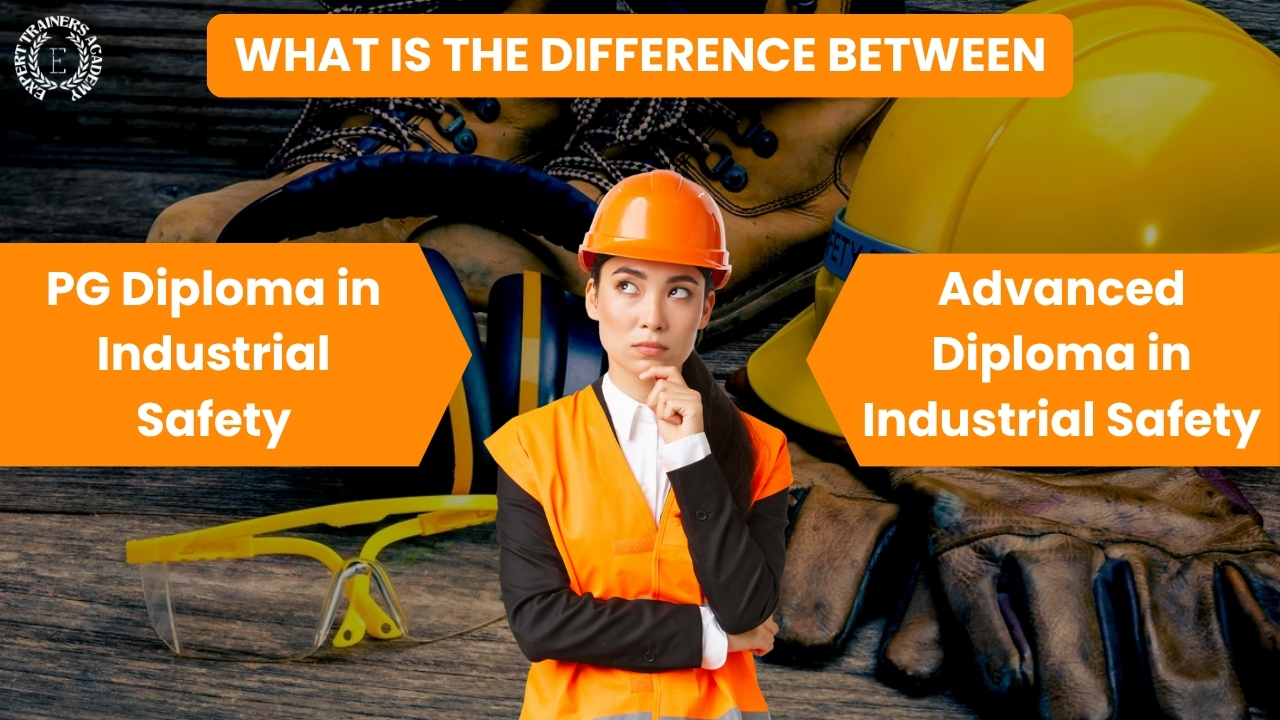
- Admin
- No Comments
- November 14, 2025
Industrial safety has become one of the most in-demand career fields across manufacturing, construction, oil & gas, chemical plants, warehouses, and other high-risk work environments. As industries grow and workplace hazards become more complex, companies actively seek qualified safety professionals who can create safer, more compliant, and accident-free workspaces.
To build a career in this field, many students and working professionals explore courses like the PG Diploma in Industrial Safety and the Advanced Diploma in Industrial Safety. Although both programs sound similar, they differ in terms of eligibility, course depth, career opportunities, and training outcomes.
If you’re confused about which course is the right fit for your career, this blog will help you understand the key differences between a PG Diploma in Industrial Safety vs Advanced Diploma in Industrial Safety, including syllabus, duration, career scope, job roles, and more.
What Is a PG Diploma in Industrial Safety?
A Post Graduate (PG) Diploma in Industrial Safety is an advanced-level program designed for graduates who want specialized knowledge of workplace health and safety. This course focuses on building strong analytical, technical, and managerial skills that help learners understand complex safety systems.
Eligibility
Typically, the eligibility criteria include:
- A bachelor’s degree in science, engineering, environmental studies, or related fields
- Some institutes allow graduates from any stream
- Working experience in industrial sectors can be an added advantage
Because it is a postgraduate program, this course is designed around a higher academic standard and deeper technical understanding.
Course Structure
A PG Diploma usually covers:
- Advanced industrial safety management
- Occupational health & hygiene
- Risk analysis and accident investigation
- Industrial laws and regulatory compliance
- Fire technology and emergency response
- Environmental management systems
- Hazard identification, assessment, and control
The curriculum is more detailed because it aims to prepare learners for supervisory or managerial roles in safety departments.
Duration
The program duration is usually:
- 1 year (12 months)
Some institutes may offer a 10-month or 18-month variant
Course Objective
The primary goal is to provide:
- A high-level understanding of safety engineering
- Skills to design, monitor, and evaluate safety systems
- Leadership abilities to manage safety teams
- Knowledge to handle compliance and audits
Benefits
- Better career opportunities
- Higher salary packages
- Eligible for safety engineer or HSE manager roles
- Accepted globally, especially in Gulf countries
- Suitable for graduates aiming for long-term growth
Comprehensive PG Diploma in Industrial Safety Training
Build a strong foundation in workplace safety with essential skills, practical training, and industry-oriented modules designed to prepare you for high-demand safety roles.
What Is an Advanced Diploma in Industrial Safety?
An Advanced Diploma in Industrial Safety is a comprehensive job-oriented program designed to train individuals in practical safety techniques used in industries. It is suitable for both freshers and working professionals who want direct entry into safety roles.
Eligibility
Unlike the PG Diploma, the Advanced Diploma generally has more flexible entry requirements:
- 10+2 (any stream)
- Diploma holders
- ITI students
- Graduates from any field
- Working professionals
This makes it accessible to a wide range of learners.
Course Structure
The Advanced Diploma covers:
- Basics of industrial safety
- Workplace hazard control
- Fire safety and prevention
- Construction safety
- Electrical safety
- First aid and emergency handling
- Personal protective equipment (PPE)
- Work permit systems
- Safety documentation
The curriculum focuses more on practical knowledge, field training, and fundamental safety techniques used in day-to-day operations.
Duration
The duration is usually:
- 1 year
Some institutes offer 6-month or 9-month options depending on curriculum depth.
Course Objective
The primary goal is to:
- Train students for entry-level safety positions
- Build hands-on skills for real industrial environments
- Create awareness about workplace hazards
- Prepare individuals to support safety officers and managers
Benefits
- Easy entry into the safety profession
- Affordable and job-oriented
- Suitable for freshers and working professionals
- Great for starting a safety career in India and abroad
- Provides strong practical knowledge
Advanced Diploma in Industrial Safety
Enhance your expertise with advanced safety techniques, risk management strategies, and leadership-focused training ideal for career growth and senior-level opportunities.
Key Differences Between PG Diploma in Industrial Safety and Advanced Diploma in Industrial Safety
Below is a simple comparison to help you understand the major distinctions:
| Category | PG Diploma in Industrial Safety | Advanced Diploma in Industrial Safety |
|---|---|---|
| Level | Postgraduate Level | Diploma Level (Intermediate–Advanced) |
| Eligibility | Graduate (preferably science/engineering) | 10+2 / Diploma / Any Graduate |
| Course Nature | Technical, analytical, and managerial | Practical, skill-based, hands-on |
| Depth of Study | Higher academic depth | Moderate academic depth |
| Best For | Supervisory and managerial career paths | Entry-level jobs and skill development |
| Career Position | Safety Officer, Safety Engineer, HSE Manager | Safety Assistant, Safety Supervisor |
| Duration | 1 Year | 1 Year (sometimes 6–9 months) |
| Focus Area | Advanced safety management and compliance | Everyday industrial safety practices |
| Salary Scope | Higher, due to qualifications | Good for beginners |
Which Course Is Better for You?
Both courses are valuable, but the right choice depends on your education level, experience, and career goals.
Choose PG Diploma in Industrial Safety if:
- You are a graduate (especially in engineering or science)
- You want a higher-level qualification
- You aim for roles like Safety Engineer or HSE Manager
- You want deeper and more technical knowledge
- You plan to work in industries like oil & gas, petrochemical, or manufacturing
This course gives you an advantage when applying for senior roles and international opportunities.
Choose Advanced Diploma in Industrial Safety if:
- You have completed 10+2 or hold a diploma
- You want to quickly start a career in safety
- You prefer a more practical and job-oriented program
- You want to work as a Safety Supervisor or Safety Assistant
- You want a foundation before taking advanced certifications
This is a great starting point for beginners entering the safety profession.
Career Opportunities After Both Courses
After completing either program, students can explore a wide range of job roles across industries.
1. Job Roles After PG Diploma
- Safety Officer
- HSE Engineer
- Safety Supervisor
- Safety Manager
- Industrial Hygienist
- Risk Analyst
- Compliance Officer
- Environmental Health & Safety Manager
These positions often involve strategic planning, compliance audits, safety reporting, and leadership responsibilities.
2. Job Roles After Advanced Diploma
- Safety Assistant
- Safety Steward
- Safety Supervisor (with experience)
- Fire & Safety Technician
- Construction Safety Helper
- Site Safety Support
These jobs are more operational and field-based.
Why Choose a Career in Industrial Safety?
The industrial safety field is rapidly expanding because companies now focus more on:
- Reducing workplace accidents
- Maintaining compliance
- Protecting workers from hazards
- Ensuring sustainable operations
Some major benefits of pursuing a safety career include:
- Attractive salary packages
- Opportunities in multiple industries
- High demand in India and abroad
- Long-term career stability
- Growth into managerial positions
Choose Expert Trainers Academy for Industrial Safety Courses
When it comes to building a strong and rewarding career in industrial safety, choosing the right institute is just as important as choosing the right course. Expert Trainers Academy stands out as a trusted education partner for aspiring safety professionals. With industry-focused programs, updated curriculum, and highly experienced safety trainers, the academy ensures students gain both theoretical knowledge and real-world practical exposure.
Why Choose Expert Trainers Academy?
- Experienced Faculty: Learn from certified and industry-experienced trainers.
- Industry-Approved Curriculum: Courses designed as per current industrial safety standards.
- Hands-on Training: Practical sessions, case studies, and real-life scenarios for better learning.
- Flexible Learning Options: Online, offline, and blended training modes available.
- Placement Assistance: Support in interviews, resume building, and job opportunities.
- Affordable Fees: High-quality education at competitive pricing.
At Expert Trainers Academy, the focus is not just on teaching—but on shaping confident, skilled, and job-ready safety professionals.
Overall Summary
Both the PG Diploma and Advanced Diploma in Industrial Safety offer excellent opportunities for anyone looking to build a rewarding career in workplace safety. The key difference lies in the level of study, eligibility, and career goals. Whether you are starting fresh or looking to upgrade to a higher professional level, there is a course suited for you.
If you want a program that offers expert training, real-world exposure, and industry-recognized certification, consider enrolling through trusted institutes.
Expert Trainers Academy offers both the PG Diploma in Industrial Safety and the Advanced Diploma in Industrial Safety, providing high-quality training and placement support.
FAQs (Frequently Asked Questions)
Ans: If you are a graduate, the PG Diploma is better. If you are 12th pass or a diploma holder, the Advanced Diploma is ideal.
Ans: You can take the Advanced Diploma, but the PG Diploma requires graduation.
Ans: Construction, oil & gas, chemical plants, manufacturing, logistics, warehousing, and engineering services.
Ans: ADIS stands for Advanced Diploma in Industrial Safety. It is a specialized program designed to provide in-depth knowledge of workplace safety, hazard control, and industrial risk management
Ans: PDIS stands for Post Diploma in Industrial Safety or PG Diploma in Industrial Safety (depending on the institute). It focuses on equipping diploma or engineering graduates with essential industrial safety skills and compliance understanding.





